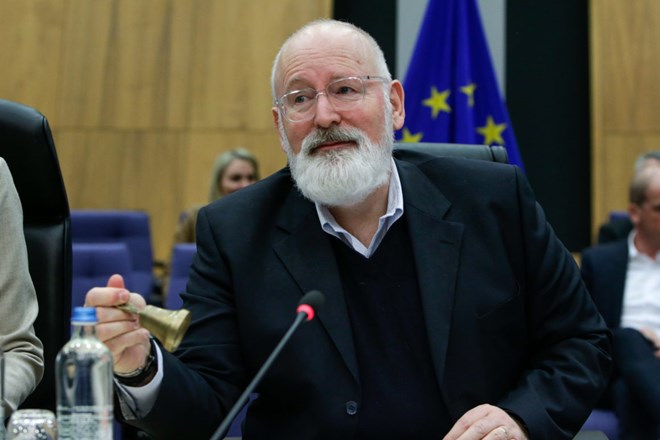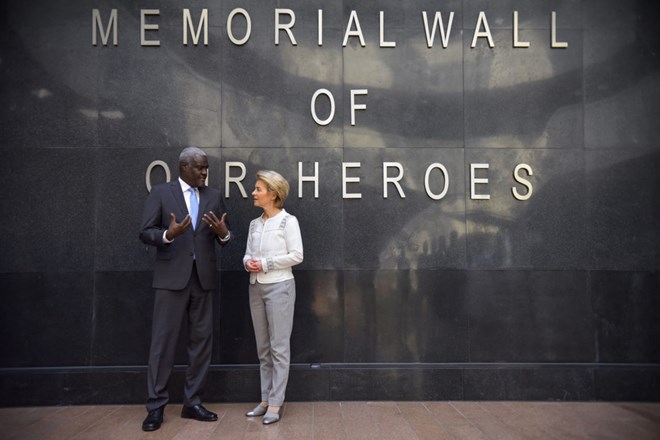The African Union had a clear message for Brussels: We appreciate your interest, but we can solve our own problems, thanks.
European Commission President Ursula von der Leyen arrived in the Ethiopian capital Thursday with a large delegation from Brussels, including 20 commissioners, hoping to forge a new strategic partnership with the 55-country African Union. More concretely, they wanted to use their meetings with their AU counterparts to take a crucial step forward in drafting a new Africa strategy that Brussels is hastily putting together to debut next week.
Unlike a similar strategy launched by the U.S. in 2018, which concentrated more on how Washington can counter the rising influence of China and Russia in Africa, Brussels wants to convince its neighbors to the south that Europe’s strategy will take Africa’s interests to heart.
But while the AU leadership is happy to strengthen its ties with Europe, the body is more interested in its own Africa strategy. The buzz around the heavily repeated slogan of finding African solutions to African problems was hard to miss at the AU headquarters, be those rising insecurity in the Sahel or climate shocks in the east.
“A very important lesson: African solutions to African problems,” Frans Timmermans, vice president of the European Commission, told reporters after commissioners from the AU and EU had concluded their talks. “We should not now think we can reinvent the wheel from scratch.”
One area where Africa did ask Europe for help was in building roads and rail networks, a key component if the AU is to realistically see the African Continental Free Trade Area — a regional trade agreement that came into effect in May 2019 — ever fully come to life.
The African bloc’s commissioner for infrastructure and energy, Amani Abou-Zeid, has requested another meeting with the EU before the end of March to explore ways that Europe can roll out bigger infrastructure projects on the continent that could rival China’s dominance.
“We need to talk with financial partners that the European Union has … to see what is there to help them with infrastructure,” Adina Vãlean, the EU’s transport commissioner, told POLITICO. “I’m committed to investigate because without the money for infrastructure, we are talking dreams here.”
While everyone can agree on roads, how cozy Africa and Europe will become is less clear. The AU Commission’s Chairperson Moussa Faki underscored the many differences that continue to mar inter-continental relations.

Frans Timmermans, vice president of the European Commission said that the summit was a “Very important lesson” | Aris Oikonomou/AFP via Getty Images
“Certainly, we have some differences,” Faki told reporters at a press conference alongside von der Leyen. “International criminal justice, sexual orientation and identity, death penalty, centrality of the African Union in certain crises.”
“These differences are normal, given our cultural, sociological and even spiritual diversity. Only the recognition and acceptance of these differences, the language of openness, will allow us to remove the obstacles that may hinder our cooperation,” he added.
The remarks irked senior EU officials in Addis Ababa who feel there is a lack of recognition that without EU funding, the AU project would simply collapse. In 2019, the EU allocated €320 million to AU projects, roughly half of the body’s total budget.
Like U.S. Secretary of State Mike Pompeo during his own visit to Ethiopia earlier this month, EU officials used their trip to mobilize millions of euros to combat the worst desert locust outbreak to hit East Africa in decades.
But this was a trip where the message to Europe was clear: any strategic partnership will be done on Africa’s terms.
“It’s great, all these proposals, but today for us is more about meeting the new European Commission and finding out who’s who,” said one senior AU official when questioned about Europe’s renewed interest in Africa. “Anything concrete will come later.”






























